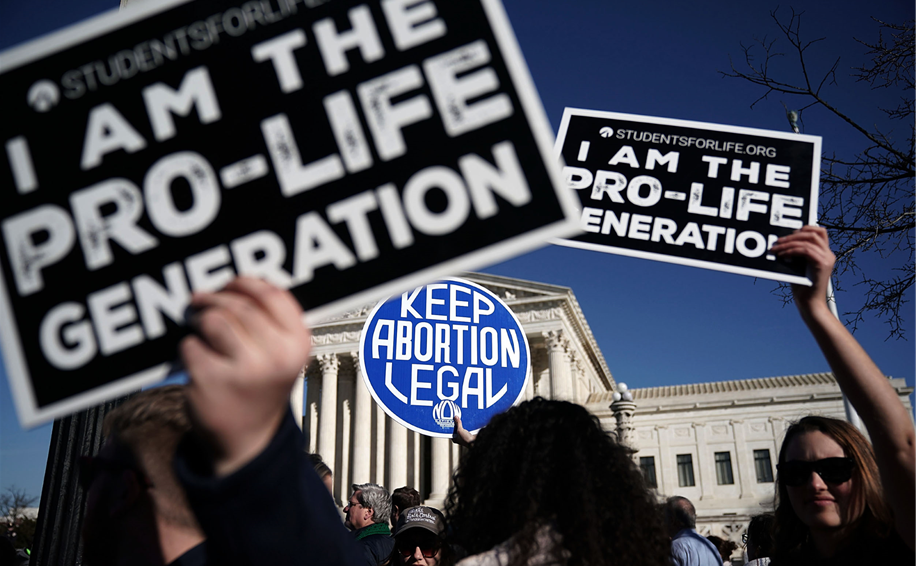The mainstream media have failed the public in their coverage of the historic overturning of Roe v. Wade.
They have buried the lead and mislabeled the positions of the so-called warring sides.
Here are some recent headlines:
From a local CBS affiliate in Illinois, “Pro-Abortion Advocates Prepare for Roe Reversal.”
From a local Illinois newspaper, “Pro-Abortion Groups Rally in Lockport in Response to U.S. Supreme Court Decision.”
Another local Illinois newspaper, “Pro-Life, Pro-Choice Supporters Rally in Chicago.”
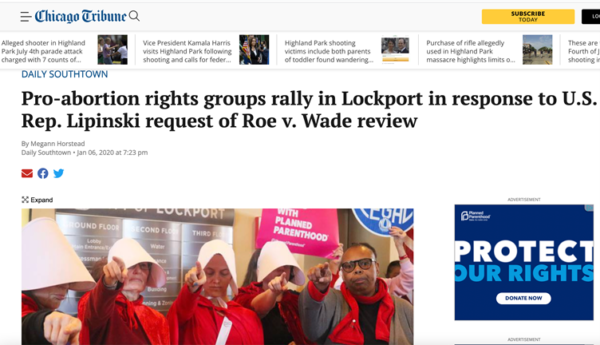
The reporting suffers from three conceptual failures.
The First
Mainstream media describes the new post-Roe U.S. as a binary of pro-abortion and anti-abortion or pro-life vs. pro-choice.
No one that we know of any sexual identity is pro-abortion. Rather, they are pro-choice, an appellation that foregrounds the agency of people who become pregnant to decide what they want for their bodies. This is an argument that has been made since the 1970s.
Referring to the pro-choice position as pro-abortion shapes a narrative that misrepresents the commitments, values, desires, and politics of pro-choice advocates. It also fails to underscore one of the most important points: In denying women control over their bodies and reproductive choices, abortions are not stopped. They are rendered harder to secure and encourage illegal and unsafe procedures.
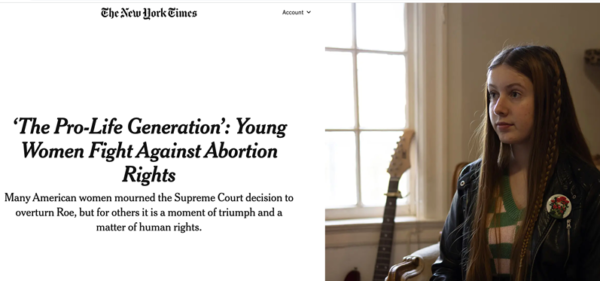
This reductionist binary is incendiary and headline-grabbing, feeding the needs of mainstream media more effectively than nuanced language, which would accurately represent the politics and the policy desires of people who are pro-choice.
For those opposed to striking down Roe, the policy and legal preferences center on agency and autonomy, hence the pro-choice language.
But even with this usage, placing pro-choice in a binary vs. pro-life suggests that those of us on the side of choice harbor a disregard for life. If the anti-choice people are pro-life, then the only conclusion left to draw is that pro-choice people are anti-life. This assumption is specious, reductionist, and absurd.
The binary nomenclature is a good sound bite but does damage to our agency in determining who rules over women’s bodies.
By attributing the concern for life to the anti-choice side, the autonomy of women’s lives is completely ignored. The “pro-life” movement should be called what it is: pro-fetus and anti-woman.
Moreover, the mainstream commercial media has failed to contribute to any comprehensive understanding of the horror and fear gripping pro-choice people because of SCOTUS’ overturning of Roe. Without such an understanding there can be no constructive dialogue.
In short, the mainstream media has failed everyone.
The Second
The second failure of mainstream media is its neglecting to examine the issues and correlated consequences of this action in any useful detail.
The majority of the analyses in Op Ed pages, commentaries, and special reports of the SCOTUS decision to reverse Roe center on taking away women’s rights and denying women control over their bodies. While those concerns are rightfully central to any discussion of this issue, there are other consequences of overturning Roe that must be addressed.
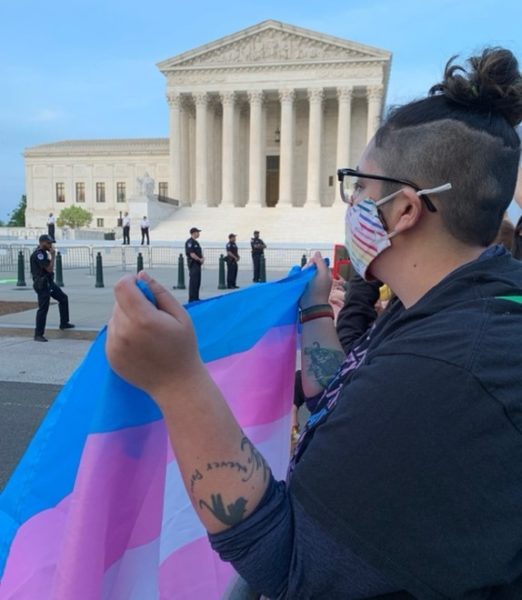
Whether a pregnancy results from casual sex or occurs in the context of a long-term committed relationship, if a woman’s death or sterility results from an illegal procedure, her partner must also live with those consequences.
Of course, addressing access to abortion for unplanned pregnancies is primary. In addition, we must also consider the collateral damage of these laws prohibiting access to others as a secondary front.
This necessitates “what if” scenario planning on the part of activists.
What if this couple lives in a state without the right to abortion? What if the partner pays for a woman to leave the state to procure a safe abortion and is then charged — as some pending state laws would allow — as an accessory to murder? What if she has an illegal abortion in a state prohibiting it and both are charged with accessory to murder?
The broad impact and many potential outcomes of the Supreme Court decision to overturn Roe v. Wade creates waves of collateral damage beyond the pregnant woman. We need radical new thinking and analyses that will shake up people who imagine they are exempt from the impact of the decision because they are post-menopausal, live in states that have preserved access to abortion, are men, are mothers of men, are asexual, and more.
This decision will alter the lives of all of us, not just women. While women being forced to bear unwanted children is and should be the primary concern, we must also look more broadly at other consequences.
The Third
Consider technology-assisted pregnancies such as in vitro fertilization. Overturning Roe will likely outlaw or severely curtail these practices, denying people who need this intervention the opportunity to have a child.

By focusing almost exclusively on the consequences to women with unplanned pregnancies, the mainstream media fail to paint a realistic picture of what will happen to everyone else.
A Strategy
As all of us in every state confront the unfolding impact of this June 24 Supreme Court decision, we must be militant on all fronts. We need to hold the mainstream commercial media accountable to tell the whole story in all its complex layers, not just the obvious, reductionist, and polarized story.
And then, as we critique, agitate, and push back against the oversimplified mainstream coverage of the overturning of Roe v. Wade, we must turn to independent media sources such as The Intercept, Democracy Now, Common Dreams, The Laura Flanders Show, Counterpunch, Truthout, The Edge, and more.
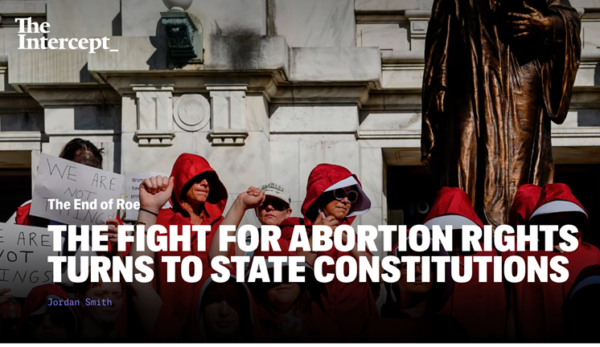
These independent media organizations bring more complexity to their reporting on Roe v. Wade, the Supreme Court decision, and political movements fighting for the right to abortion.
They counter mainstream media’s reductionist latent ideologies of pro or anti-abortion with more in-depth investigations, on-the-ground local stories, and a plurality of voices.
The time is now.
We must post and circulate all these stories on every platform available to everyone we know to change the public sphere of discourse around the overturning of Roe v. Wade. From there, we must invite all to join the movement across virtual and physical spaces to protect the right of abortion access.
Read beyond the mainstream. Bookmark independent media sites. Post. Circulate. Agitate. Demonstrate. Smash the binaries.
Noreen M. Sugrue is the President (2021–22) of the Society for the Study of Social Problems. She was a professor at the University of Illinois at Urbana-Champaign, with appointments in the Women and Gender in Global Perspective Program, LAS Global Studies, the Center for Global Studies, the Center for African Studies, and the College of Engineering. Her international and domestic research focuses on issues related to immigration, immigrants, gender, health care, and the workforce centered on inequity, inequality, and distributive justice. She analyzes and evaluates the construction and implementation of social policies as a means of both addressing and redressing inequities. She has published widely on these topics.
Patricia R. Zimmermann is the Charles A. Dana Professor of Screen Studies and Director of the Finger Lakes Environmental Film Festival at Ithaca College in Ithaca New York. The author or editor of ten books, her most recent are “Documentary Across Platforms: Reverse Engineering Media, Place, and Politics” (Indiana 2019) and “Flash Flaherty: Tales from a Film Seminar” (Indiana, 2021). Deepest thanks to Jane Banks.

